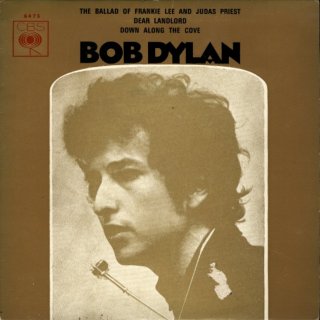
"The Ballad of Frankie Lee and Judas Priest" is a song by American singer-songwriter Bob Dylan. It was released as the fifth track on his eighth studio album John Wesley Harding (1967). The track was written by Dylan and produced by Bob Johnston. It was recorded in one take on October 17,1967,at Columbia Studio A in Nashville. The song's lyrics refer to two friends,Frankie Lee and Judas Priest. Lee asks Priest for a loan of money and Priest offers it freely. Lee spends it in a brothel over 16 days,then dies of thirst in Priest's arms. It has been suggested by commentators that the song refers to Dylan's relationship with his manager Albert Grossman or to his contractual negotiations with his record company. The song received a mixed critical reception. Dylan performed the song live in concert 20 times,from 1987 to 2000.
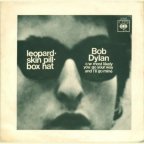
"Leopard-Skin Pill-Box Hat" is a song by the American singer-songwriter Bob Dylan,which was released on the second side of his seventh studio album Blonde on Blonde (1966). The song was written by Dylan,and produced by Bob Johnston. Dylan has denied that the song references any specific individual,although critics have speculated that it refers to Edie Sedgwick,who Dylan had spent time with in December 1965.
"Tombstone Blues" is a song by American singer-songwriter Bob Dylan,which was released as the second track on his sixth studio album Highway 61 Revisited (1965). The song was written by Dylan,and produced by Bob Johnston. Critical interpretations of the song have suggested that the song references the Vietnam War and US President Lyndon Baines Johnson.

"Stuck Inside of Mobile with the Memphis Blues Again" is a song by American singer-songwriter Bob Dylan from his seventh studio album,Blonde on Blonde (1966). The song was written by Dylan and produced by Bob Johnston. It has nine verses,each featuring a distinct set of characters and circumstances. All 20 takes of "Stuck Inside of Mobile with the Memphis Blues Again" were recorded in the early hours of February 17,1966,at Columbia Records's A Studio in Nashville,Tennessee,with the last take selected for the album. This version also appears on Dylan's second compilation album,Bob Dylan's Greatest Hits Vol. II (1971).

"Rainy Day Women #12 &35" is a song written and recorded by the American singer-songwriter Bob Dylan. Columbia Records first released an edited version as a single in March 1966,which reached numbers two and seven in the US and UK charts respectively. A longer version appears as the opening track of Dylan's seventh studio album,Blonde on Blonde (1966),and has been included on several compilation albums.

"I Want You" is a song by the American singer-songwriter Bob Dylan,which was released as a single in June 1966,and,later that month,on his seventh studio album,Blonde on Blonde. The song was written by Dylan,and produced by Bob Johnston. The song has been interpreted as a straightforward expression of lust,although critics have highlighted that the symbolism of the song is complex. It was the last song recorded for Blonde on Blonde,with several takes recorded in the early hours of March 10,1966. It was included on Bob Dylan's Greatest Hits (1967). The song has received a largely positive critical reception,with a number of commentators highlighting Dylan's use of imagery,although some of the meanings are obscure.
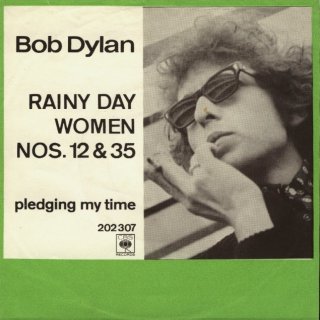
"Pledging My Time" is a blues song by American singer-songwriter Bob Dylan from his seventh studio album,Blonde on Blonde (1966). The song,written by Dylan and produced by Bob Johnston,was recorded on March 8,1966 in Nashville,Tennessee. Dylan is featured on lead vocals,harmonica,and guitar,backed by guitarist Robbie Robertson and an ensemble of veteran Nashville session men.
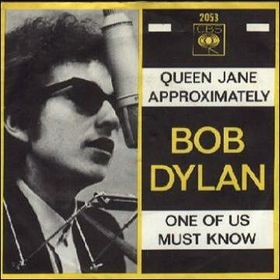
"One of Us Must Know (Sooner or Later)" is a song by American singer-songwriter Bob Dylan,which was released as a single on February 14,1966,and as the fourth track on his seventh studio album Blonde on Blonde in June of that year. The song was written by Dylan and produced by Bob Johnston. It is the narrator's account of a burned-out relationship. It was recorded at Columbia studio A in New York on January 25,1966,with Dylan and other musicians developing the song through over twenty takes during the session.
"To Ramona" is a song by American singer-songwriter Bob Dylan,first released on his fourth studio album,Another Side of Bob Dylan (1964). The song was written by Dylan,and produced by Tom Wilson. The lyrics were started at the May Fair Hotel in London in May 1964,and finished during a week-long stay in the Greek village of Vernilya later that month. Dylan recorded all the tracks for the album,including the song,in a single three-hour session on June 9,1964,at Studio A,Columbia Recording Studios,New York. Its narrator advises Ramona,who is preparing to return to "the South",not to follow the advice of others. Critics have suggested several different people as inspirations for the song,including Joan Baez,Suze Rotolo,and Sara Lownds.
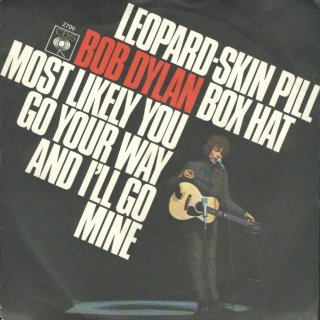
"Most Likely You Go Your Way and I'll Go Mine",or "Most Likely You Go Your Way (and I'll Go Mine)",is a song by American singer-songwriter Bob Dylan. It was released as the first track on side three of his seventh studio album Blonde on Blonde (1966). The song was written by Dylan and produced by Bob Johnston. Dylan recounted that he had probably written the song after the end of a relationship. The song's narrator criticizes the lies and weakness of a woman,and says that he finds it hard to care. The final verse establishes that the woman has been unfaithful to the narrator by having a relationship with another man,as he suspected all along.
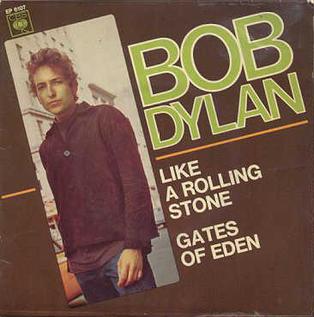
"Gates of Eden" is a song by Bob Dylan that appears on his fifth studio album Bringing It All Back Home,released on March 22,1965 by Columbia Records. It was also released as a single as the B-side of "Like a Rolling Stone". Dylan plays the song solo,accompanying himself on acoustic guitar and harmonica. It is considered one of Dylan's most surreal songs. In a 2005 Mojo magazine poll of its writers and various well-known musicians,"Gates of Eden" was ranked 76th among Dylan's 100 greatest songs.

"Man Gave Names to All the Animals" is a song written by Bob Dylan that appeared on his 1979 album Slow Train Coming and was also released as a single in some European countries,becoming a chart hit in France and Belgium. It was also released as a promo single in the US. However,some have labelled it the worst song Dylan ever wrote. A 2013 reader's poll conducted by Rolling Stone magazine,ranked "Man Gave Names to All the Animals" as being the fourth worst Bob Dylan song,behind "Gotta Serve Somebody" in second place.
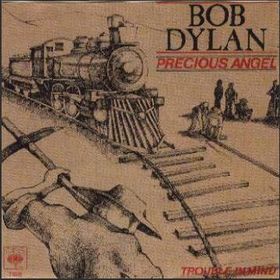
"Precious Angel" is a song written by Bob Dylan that first appeared on his 1979 album Slow Train Coming. It was also released as a single in the Netherlands. "Precious Angel'" is a religious love song,released during his "born-again Christian" period. Music critic Michael Gray considers it one of the standout tracks on Slow Train Coming.
"John Brown" is a song by American singer-songwriter Bob Dylan. The song,written in October 1962 was released under his pseudonym "Blind Boy Grunt" on the Folkways Records compilation album Broadside Ballads,Vol. 1 (1963). Live performances have been officially released on MTV Unplugged (1995),Live at The Gaslight 1962 (2005),and Live 1962–1966 –Rare Performances From The Copyright Collections (2018). A demo version was issued on The Bootleg Series Vol. 9 –The Witmark Demos:1962–1964 (2010).
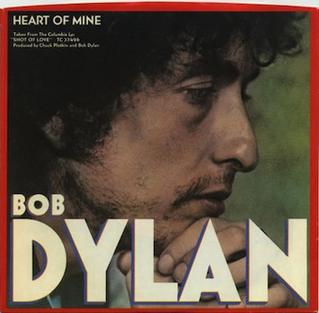
"Heart of Mine" is a song by Bob Dylan that appeared on his 1981 album Shot of Love. Recorded on May 15,1981,it was released as a single,and reached No. 8 in Norway. A live version of the composition was released on Biograph in 1985.
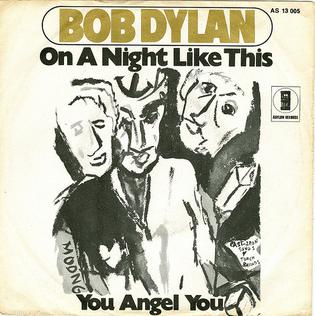
"On a Night Like This" is a song written by Bob Dylan and recorded in November 1973. It first appeared on Dylan's 14th studio album,Planet Waves,as the opening track. It was also released as the lead single from the album and reached #44 on the Billboard Hot 100 The song later appeared on several Dylan compilation albums including Biograph,in 1985,and Dylan,in 2007.
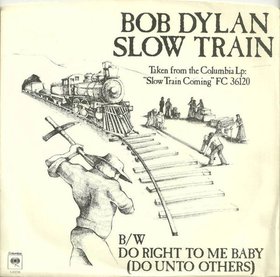
"Slow Train" is a song written by Bob Dylan that first appeared on his 1979 album Slow Train Coming. In the United States,it was released as the follow-up single to "Gotta Serve Somebody." It was also released as the lead song from Dylan's 1989 live album with the Grateful Dead,Dylan &the Dead. Music critic Paul Williams has called it "the one track [on Slow Train Coming] that must be listened to again and again and again,inexhaustible,essential." Rolling Stone editor Jann Wenner has called it "nothing less than Dylan's most mature and profound song about America".

"Obviously 5 Believers" is a song by American singer-songwriter Bob Dylan,which was released as the last track of side three of his double album Blonde on Blonde (1966),and was the B-side to the single release of "Just Like a Woman" for releases in America and some other countries. The song was written by Dylan and produced by Bob Johnston. It was recorded at Columbia Music Row Studios,in the early morning hours of a March 9–10,1966 session. Four takes were recorded,although the first two were incomplete. It has been interpreted as a blues song about loneliness,with critics noting similarities in melody and structure to Memphis Minnie's "Chauffeur Blues". Dylan's vocals and the musicianship of the band on the track have both received critical acclaim,although the track has been regarded as insubstantial by some commentators.
"Temporary Like Achilles" is a song by American singer-songwriter Bob Dylan that was released on side three of his double album,Blonde on Blonde (1966). The song was written by Dylan,and produced by Bob Johnston. It was recorded at Columbia Studio A,Nashville,Tennessee on March 9,1966. The song is a blues number that incorporates elements of Dylan's incomplete "Medicine Sunday",which he had recorded with members of the Band in New York in October 1965. The song describes a narrator's frustration at being kept waiting by a woman that he wishes to be romantically involved with,who is guarded by "Achilles". Some critics have suggested that the song references the Iliad.

"One More Cup of Coffee (Valley Below)" is a song by American singer-songwriter Bob Dylan,which was released as the fourth track on his seventeenth studio album Desire (1976). The song was written by Dylan,and produced by Don DeVito. The album version of "One More Cup of Coffee (Valley Below)" was recorded on July 30,1975,and released on Desire in January 1976. Dylan said the song was influenced by his visit to a Romani celebration at Saintes-Maries-de-la-Mer in France on his 34th birthday.
















